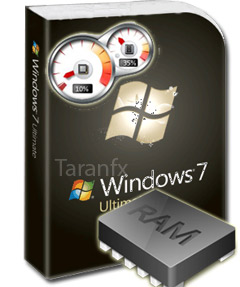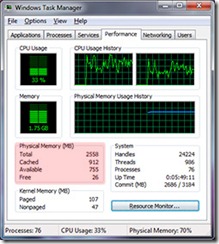 Windows 7 is, no doubt, a evolution in windows platform. But the bad side of it is seen as a “Higher memory Footprint” as compared to previous generation OS like Windows XP and even when compared to Linux like Ubuntu 9.1
Windows 7 is, no doubt, a evolution in windows platform. But the bad side of it is seen as a “Higher memory Footprint” as compared to previous generation OS like Windows XP and even when compared to Linux like Ubuntu 9.1
Often, one would say Windows 7 has memory leaks, Windows 7 is a memory hog, but all these blames are pretty unfair and FUD. The truth is the extra memory footprint is to enhance the speed.
Windows 7, just like Windows Vista, includes aggressive disk caching. The SuperFetch mechanism causes Windows to preload certain data if the OS detects that it is used regularly, even if there is no specific need for it at that given moment.
SuperFetch is less aggressive in Windows 7, but still use a substantial amount of memory. But it’s not bad, 7 will feed on RAM only when there is no other demand for that memory. And when an application needs lots of memory then Windows will purge the cache and make the RAM available to the needy-application.
So using the wasted memory is a not a bad idea. If pre-loaded data comes to a use at a later time, it makes sense altogether and SuperFetch is good at ensuring that only that data is loaded, which is likely to be needed. All this makes it it much faster to access, the difference is obvious: 10s of milliseconds to sub-nanoseconds.
Windows XP and Ubuntu with their so called “low memory usage”, does nothing like this, thereby showing higher free memory. But that has no practical advantage, we are just not using the resources up to the mark. And yes this is the reason why Windows 7 depletes battery faster, may be its wise to disable it in services.
So next time you open Task Manager, the important number is not “free,” but “available”. The “available” memory includes both memory that is free, and memory that can be made available by getting rid of cache instantly. This “Available” count is new in Windows 7.
Simply summarizing, what looks may not be always the case, Microsoft Windows 7 has lots of good work under the hood, go on, dig deeper and you would find solutions. More on Why Windows 7
We write latest in Microsoft, Windows 7, Android, Google, iPhone, Tech Guides, Open Source, get them all @taranfx on twitter or below:
loading...
loading...

